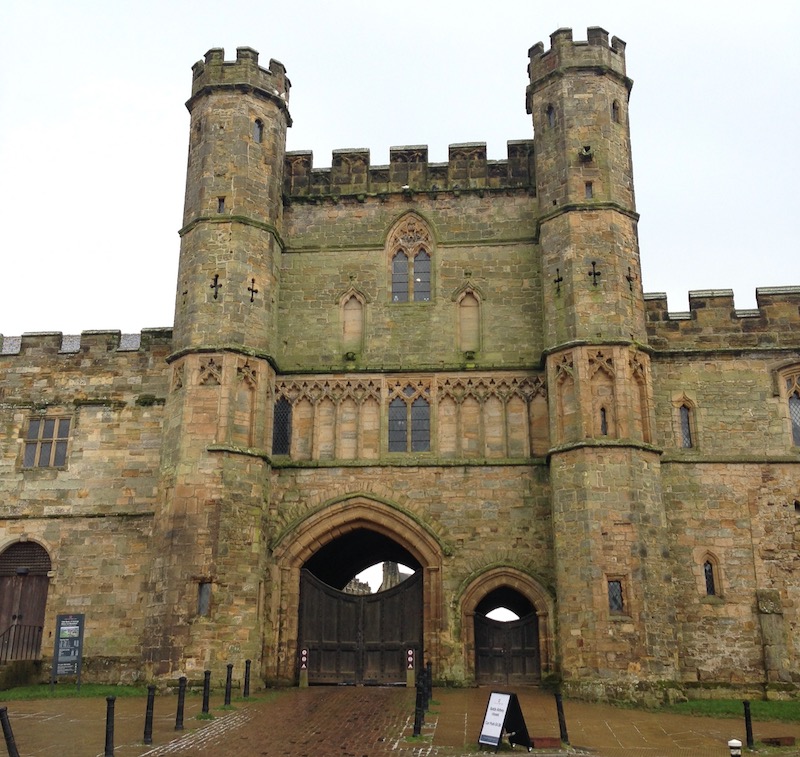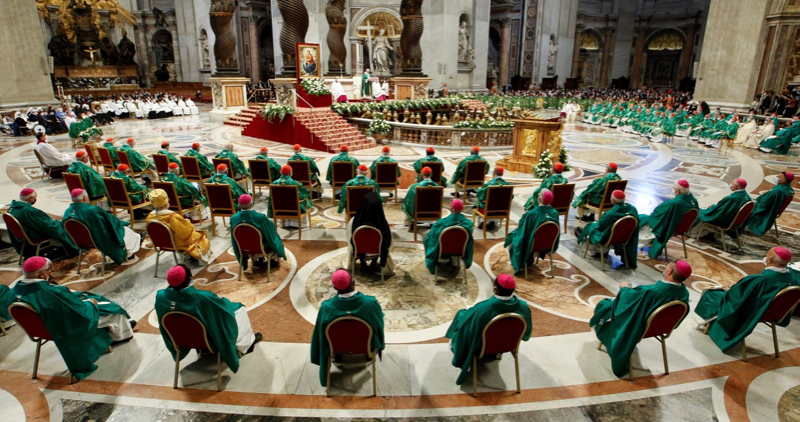It’s difficult to think of a time when it would be more problematic to hold the sort of synod the Pope seems to be hoping for, short of wartime. As this is a global synod for a catholic Church, in some places people will indeed be trying to do it in the midst of war, and we should remember them in our prayers. But even here, in affluent western Europe, the situation is not conducive to the careful, prayerful mutual listening that is supposed to be at the heart of the process.
For the last nearly two years, and it feels longer, our parishes have been atomised, limited, reduced and even for periods closed outright. We have seen far less of our communities than we would have done in normal circumstances, with some vulnerable and elderly parishioners isolated for months. As we move into November and hold familiar services for the dead, there are stark reminders, like the long list of pandemic deaths in the Book of Remembrance on the altar, that we have lost valued members and not even been able to go to their funerals, even if funerals were able to be held. Our normal relations with our fellow-parishioners are barely recognisable. Many of our churches are chilly and still only sparsely populated.
Yet here we are at the beginning of the synodal process which is supposed to move from the grassroots up towards sessions in Rome in summer to autumn 2023. But when the grass has been battered and trampled, there are chances for wild flowers to creep in; or to change the metaphor, the Holy Spirit finds it easy to enter by the cracks, and this must be our hope here, especially with our God of surprises. Here’s what is happening in my parish.
I knew about the synod because of reading The Tablet, and not because of anything happening locally or any information being offered at parish level. This is one reason why I read The Tablet, of course. I know what’s going on. But especially at the moment, that means that there is likely to be an awful lot of people who are still unaware of the synod.
All our Catholic newspapers and publications were removed from the porch area at the first lockdown to stop anyone touching anything and they have still not come back. No Missals, no hymnbooks, no parish newsletters, except on-line for us compulsives, and no Catholic press. So, apart from those of us lucky enough to have a postal or digital subscription to The Tablet, no information, except what was offered orally at the notices at the end of Mass, and the synod did not figure there at all.
I was beginning to wonder if the whole thing had been cancelled, when, out of the blue, we had a pastoral letter instead of a sermon at Mass on October 17, from the archbishop, where we were told that the process was basically for the next month and that each parish had been asked to nominate two people as parish representatives. There were questions to consider which could be found on-line.
This was surprising, to put it mildly, and certainly quite a lot to take in at once. It was also completely new. Two things immediately stood out: first, if the parish needed two representatives, wouldn’t it have been a good idea to tell us earlier, especially as the timeframe was so tight; and second, that was a completely risible length of time for the sort of conversation which was envisaged. If the process is running until 2023, how come the parishes have one month to start and finish their input? We are the Church. The proportion of time allotted was almost insulting. And we would need to be brought together to talk and listen to each other about these things, as there are no current groups to do this in my parish, nor, I imagine, in most people’s. The deaneries, the dioceses, the bishops’ conferences all have forums which they can retool to have their discussions and do their discerning; we are starting from scratch, though groups like the SVP and similar will be able to organise a joint response more easily
I am glad to see that this part of the process has been extended, though not by much, but I did not feel any sense of urgency in the pastoral letter. I discovered well after the event that there had been a live-streamed Mass to launch the synod, followed by some sort of meeting or question-and-answer session, and maybe I should have been able to find out about this sooner. But I didn’t. There was nothing in our (digital-only) parish newsletter in the weeks before this (I went back and checked, in case I had missed it), and since then we have simply had the synod prayer written out for us and an increasingly desperate one-line plea for volunteers. We were away for the second week of the four-week consultation (it was half term), so I resolved to support it as much as I could at a later stage…..but still nothing seems to be happening. We read the synod prayer together after Mass on Sunday this week, at least those of us who had picked up a card on the way in, though nobody had suggested that this was a good idea, or offered them as people entered. This was the first time we have read the synod prayer together; this is the third week of the supposed four-week consultation, now fortunately extended, though I’m not sure that the parish bit has been given much extra time.

I had a major piece of luck last week (guardian angel or the Holy Spirit, maybe). I went up to church for my Adoration hour, and seized the opportunity to check the noticeboards in the church porch, because I was still feeling that there must be more information somewhere. By now surely somebody must be trying to engage the parishioners? I didn’t find anything about the synod, except, down in a far corner, there was a hard copy of the pastoral letter from October 17. Just one copy, but it was by now November 4, and I’m deaf in one ear, so I felt able to justify going off with it. And there in a footnote was a web address for more information. I was delighted, but also worried.
This is meant to be a process of talking and listening especially to those whose voices are not generally heard. If you want to do that, you have to make it easy for people. I am fairly tech-savvy, and, thank God, I have children at home if I need more digital help. How will everybody else even know where to look, as I have the one hard copy of the pastoral letter? And there is so little time. The questions we are meant to be debating are vast. At any summit or high-level meeting, as everyone knows, the bulk of the talking and listening has to be carried out beforehand. The Holy Spirit can do anything, but he needs our co-operation. I feel that my parish is floundering because it feels out of its depth, and no leadership is being offered. And the Pope doesn’t want just a debating shop, he wants time and space to talk, listen and discern. Building this from the ground up is quite an undertaking.
I have read (thank you again, Tablet) of other parishes having questionnaires or surveys, and I think this is a good idea. Another model which might help is “death cafes”, where people come and sit in small groups deliberately to talk about the things that most people shy away from. For this though, we might need something less diffuse than the suggested questions, less pressure and more openness. I don’t have any answers. I’m just looking at what we are being asked to do. Part of the problem is that we have no current mechanisms to elicit the views of the people in the pews. In parishes when we have been living abroad, I would have been able to start with my bible study group or discussed it with people after Mass, but those were smaller parishes. Here when I tried to join a bible study group, I was told there was no room for another person in either of the two parish groups. Because of the pandemic, loitering to chat after Mass has been discouraged for some time. Priests are overworked and less available than they used to be and finding one to talk to is almost impossible.
Another problem is clericalism, or you might call it a particular Church version of toxic masculinity, where the views of women are regarded as irrelevant or insignificant. Yet women are often the people who do a lot of the basic work of the Church. We really need to know what they think. They are closer to the ideas of Jesus and the Pope about what the Church is for. Many are mothers, who know that giving up on someone is simply not an option, and choosing different groups to be horrid to is not an answer. Their insights into the Church as field hospital, as a place of service, love and healing, need to be heard; but they have been actively discouraged from speaking out for a long time, and that attitude is hard to shift. Building trust takes time.
With an institution like the Church, inertia is a colossal force. No one wants to rock the bark of Peter; we know it is assailed from every side and we love it, but semper reformanda is as true today as it ever was. I think that the Pope’s emphasis on listening is to enable us all not to react defensively. If we all love the Church, then we all want her to be the best she can be, and if we don’t jump to conclusions, the Holy Spirit has space to act.
This should be a colossal opportunity, so we must not waste it. We need leadership from the hierarchy and engagement from the people, but nothing is going to happen unless we pass on the information. We are the people of England, and we have not spoken yet. So far, in my parish, the synod has felt like a small and distant secret; but maybe this should be our chance.
Kate Keefe composes musical settings for the Mass and writes about the psalms. You can follow her on Facebook, Twitter and LinkedIn



 Loading ...
Loading ...
What do you think?
You can post as a subscriber user ...
User comments (0)